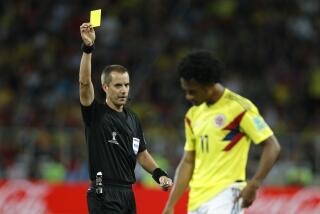WORLD CUP USA ‘94: SEMIFINALS : Bulgaria Blames French Resistance : Officiating: Referee accused of bias because of his nationality; Bulgaria beat France in decisive Cup qualifier.
- Share via
EAST RUTHERFORD, N.J. — After it was over, after Bulgaria’s dream machine was left broken and battered in a 2-1 semifinal loss to Italy, Hristo Stoitchkov was asked if God was still a Bulgarian.
“Yes,” the temperamental striker said. “But the referee was French.”
And in soccer, that might mean more. At least it did to Bulgaria on Wednesday at the Meadowlands where the World Cup’s surprise team finally met a match it did not like.
Everyone wearing the white, green and red of Bulgaria thought Joel Quiniou, the referee, not Italy, was the problem. The consensus from coach to players to the Bulgarian press was Quiniou missed two crucial calls in the second half that would have given Bulgaria a good chance to send the game into overtime.
“Today it was again proven the officiating of this World Cup was among the weakest in the history of World Cups,” said Stoitchkov, who was replaced in the 79th minute because of a slight leg injury.
Perhaps it was East European suspicions left over from the Cold War, but the Bulgarians had reason to question the choice of Quiniou as their referee.
After all, it was last November in Paris that Emil Kostadinov scored in the last minute to eliminate France from World Cup ’94.
“I don’t think it was a mere coincidence that this referee was chosen,” Stoitchkov said.
Kostadinov was involved in the first controversial play midway through the second half when he dribbled through the Italian defense into the penalty box. The ball took a high bounce and hit Alessandro Costacurta’s hand. Kostadinov said it was intentional.
Quiniou did not see it that way, and he probably was right. When the ball accidentally hits a defender’s hand, play continues. Otherwise, Bulgaria would have earned a penalty kick.
“The referee had the whistle in his mouth, and then he looked at the linesman and changed his mind about blowing the whistle,” said Borislav Mihaylov, Bulgaria’s goalkeeper.
The second controversial play came near the match’s end when Yordan Letchkov collided with Roberto Mussi on the right side of the goal. Bulgaria wanted a free kick, but Quiniou did nothing. Both players were going for the ball and it was difficult to determine if a foul was committed.
Coach Dimitar Penev of Bulgaria thought his team deserved one call, if not both.
“Two is too much,” he said. “Maybe one would have been fair.”
Bulgaria’s defeat did not detract from its brilliant performance in the tournament; it has a chance to finish third in the world. Its sudden rise in international soccer still is difficult to fathom.
Nine years ago, it seemed Bulgaria would never develop a serious soccer program. During a 1985 match pitting Levsky Sofia against CSKA, the army team, a riot broke out when players, coaches and fans charged the Communist regime fixed the game in CSKA’s favor.
While fans brawled in the stands, Stoitchkov and CSKA teammate Nasko Sirakov fought with Mihaylov in the tunnel leading to the locker rooms. They were suspended for life but reinstated after seven months--in time for World Cup qualifying in 1986.
The hard feelings have never ceased, but the three have been instrumental in leading the 1994 national team.
A bigger obstacle was gaining international experience until the breakup of Communist East Europe. Sirakov, Bulgaria’s leading scorer in last year’s club league, was the first to play abroad.
Soon, others followed and more than half of the World Cup team is playing in West Europe now.
“We don’t have to worry about what the government says anymore,” Mihaylov said. “That has been the secret.”
Now there are other problems, namely, money. After Bulgaria’s victory over France in Cup qualifying, federation president Valentine Mihov offered $100,000 bonuses to players.
The federation was unable to deliver, which caused an uproar on the eve of the World Cup. Players were mollified with $25,000 bonuses, but not before Mihov was forced to resign a few weeks before the Cup.
“Everything’s settled now,” said Hristo Danov, federation vice president.
Everything except that French referee.
More to Read
Go beyond the scoreboard
Get the latest on L.A.'s teams in the daily Sports Report newsletter.
You may occasionally receive promotional content from the Los Angeles Times.






